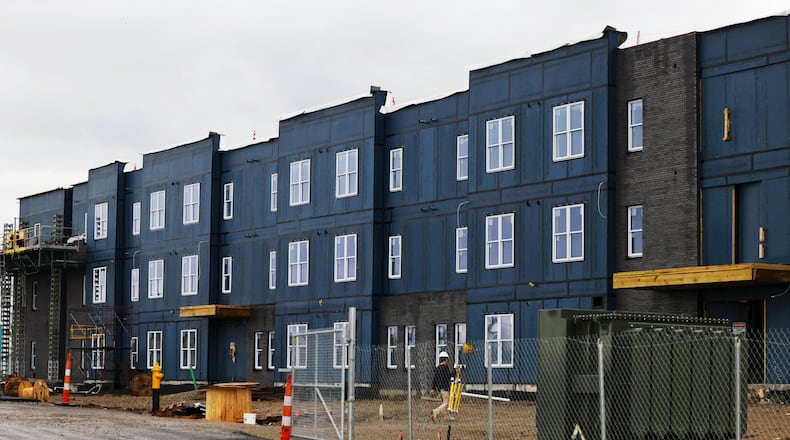The YWCA is constructing a three-story facility that incorporates 45 one-bedroom apartments for permanent supportive housing (PSH) for eligible homeless families. The first floor will be 15 one-bedroom apartments, serving as a domestic violence shelter. It’s an $11 million project that will help more people within the county.
Waters-Connell expects to take the current 31 living at 244 Dayton St. to the new building, which would mean two-thirds of the facility would be filled. She said the process of pre-screening potential tenants for the remaining 14 units now, but there are timelines for certification of income to ensure individuals are eligible. That will start in June or July, she said.
“We’d love to have all 45 (PSH) units to be filled on Day 1,” said Waters-Connell, but it’s a “process of coordinated entry” where chronically homeless individuals are working with PATH Outreach case managers or are in homeless shelters, and their Homeless Management Information System.”
“We’re in a part of the state called Region 14, and that includes Butler and Clermont counties, and we are identified as the No. 1 priority for the Coalition of Housing and Homelessness in the state of Ohio for permanent supportive housing,” she said. That means if someone else wanted to build another PSH project, there would be the support for it “because we have so many homeless people.”
In 2010, the Ohio Interagency Council on Homeless and Affordable Housing has adopted the goal of creating thousands of new PSH opportunities to help address high-priority permanent housing and supportive services needs of the most vulnerable households with serious and long-term disabilities.
“These new PSH opportunities are essential for Ohio to address homelessness and chronic homelessness among Ohioans with disabilities,” according to the state. The objective is to reduce “Ohio’s reliance on expensive and unnecessary institutional settings.”
Though the Ohio Interagency Council on Homeless and Affordable Housing called the goal “ambitious,” the state needs to balance the concerns of those currently homeless and those at risk of homelessness or institutionalization. The council stated it is achievable through PSH policy framework.
The PSH portion of the YWCA’s building is being paid through public funds, including the Low Income Housing Tax Credit program, Butler County’s and Hamilton’s Community Development Block Grant programs, and an Affordable Housing Program grant.
The domestic violence support portion of the building is being paid for with funds raised through a capital campaign, Waters-Connell said. Though the 15 single-family rooms are an expansion of domestic violence housing, it’s not enough, Waters-Connell said.
In 2020, there were 850 domestic violence incidents reported in Butler County. However, more than 1,000 went unreported, said Waters-Connell. Those incidents are uncovered through various means, including conversations of people coming to domestic violence shelters.
Waters-Connell said they do the best they can to provide shelter for domestic violence victims, either with their facility or a referral to another facility. If a shelter doesn’t have an opening, Waters-Connell said they provide immediate safety planning for those individuals until an opening is available.
“We do the best we can,” Waters-Connell said. “The shelter is certainly doubling the capacity, nearly tripling it if you think about a parent and children that would be in one unit. Right now all we have are sleeping rooms. This is really terrific development, for sure. But in theory, we need more than we currently are building.”
Though the building cannot support every victim of domestic violence, they do complement the housing through programming and awareness. That preventative work is done through the youth programming, which includes defining healthy relationships and domestic violence, resources available, and resources for those who feel they aren’t safe.
They also work to develop relationships with community partners, the largest being Women Helping Women.
The new YWCA of Hamilton building sits on a 3.6-acre site, and is considered state-of-the-art and energy-efficient. There are also on-site administrative offices, outpatient offices for partner agencies, and a community space for social and recreational use.
Waters-Connell is finalizing capital needs for furniture, playground equipment, and supplies for the building.
The YWCA of Hamilton won’t retain its current facility on Dayton Street, and plans to be out of the building by early 2023. Waters-Connell said the building won’t go on the market until it’s been vacated, but that doesn’t mean they won’t show the building to interested potential buyers.
“We absolutely would encourage people to reach out to us,” she said.
But Waters-Connell said it won’t necessarily go to the highest bidder, though she said they want to sell it for as much as possible. They’d like to see it go to a buyer who will be looking out “for the community’s best and most appropriate need. We hope and pray as we stay involved, its historic significance is somehow preserved.”
The YWCA building at 244 Dayton Street was built in 1931, 29 years after the organization was chartered by Dr. Julia Goodman. The organization was founded by Goodman in 1900.
Waters-Connell said the YWCA is in the midst of its five-year strategic plan, which included the construction of the Grand Boulevard building,
Help for domestic violence victims
If you’re a victim of domestic violence, call the crisis hotline at 1-800-618-6523.
About the Author

